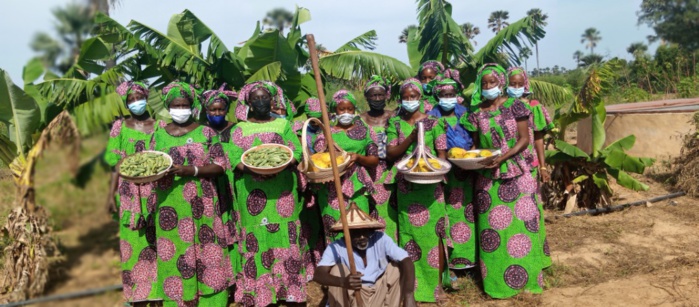For many, support for women’s socio-economic initiatives is essential to revive the economies of our countries, especially in this post-pandemic period. For this fringe which constitutes more than half (52%) of the Senegalese population, 6 out of 10 of them live and work in rural areas where they constitute 68% of the workforce, revealed statistics from the Ministry of Women, Family and Children.
In this regard, an analysis of the national context revealed the involvement of many actors and civil society organizations, but it also revealed a lack of synergy between interventions on the issue of women’s access to and control of land resources.
Aware of this diversity of actors and initiatives, the organizations discussed the need to define a common and concerted working strategy based on the priorities identified by the different dynamics underway. This consultation led to the establishment of a national platform called the National Alliance for the Promotion of Women’s Land Rights (ANFF).
The latter entity has just taken a leap forward, after joining the international community in celebrating the role and place of Senegalese rural women, who are marked by precariousness in terms of access to and effective use of land resources. During a webinar held on Friday, December 17, which brought together civil society actors and even government officials, a commitment was made on behalf of the Ministries of Women and Agriculture to enter into a partnership with ANFF.
”The Senegalese rural woman marked by the seal of precariousness in terms of access to land resources”.
Speaking on the opportunities in the agricultural sector for women and the type of partnership with Anff, Ms. Sokhna Ndèye Mbacké, representative of the department in charge of agriculture, reported on the strategic and operational levels.
If I come to the partnership, because we intervene on two levels: there is the strategic level and the operational level with many initiatives underway, currently. What we are proposing to the alliance is really to go towards a partnership agreement where we will be able to highlight the two levels, whether it is operational, institutional or strategic. I think that this is what will really help the alliance to work better with the Minister of Agriculture. And this draft partnership agreement will be backed by an action plan that will be followed by both parties.
She took advantage of her presentation to go back over the main lines of this circular for the benefit of women. For the circular, the measures that have been taken are related to the allocation of a quota of at least 15% of developments to women. Because it should be known that agriculture facilitates access to land for women. So, through measures, the Ministry of Agriculture has asked that at the level of its services such as Saed which make agricultural developments, to allocate 15% of these developments to be carried out from surface water but especially at the level of other structures such as Anida (National Agency for Integration and Agricultural Development) and projects and programs that intervene in groundwater,” said Ms. Mbacké.
She also indicated that it is also requested to “allocate at least 20% of the developments to women; to allocate at least 10% of the subsidized tractors to women; to allocate at least 40% of the funding to women and to allocate at least 20% of the funded agricultural research projects to women, but also to increase to 20% the rate of representation of women in decision-making bodies. Because most decisions are made at the level of these bodies. This means, according to her, that efforts are being made to better take into account the concerns of women.
”That the alliance be unavoidable on these issues related to women’s access to land”
The representative of the Ministry of Family, Mrs. Sadio Kanouté, was also in favor of formalizing a tacit partnership between the ANFF and the department she was working for. As I said earlier in my presentation, we are open to any type of partnership. And to reassure you, the ministry is available to sign an agreement. So we are ready to go,” she concluded.
For Ms. Julie Cissé, coordinator of the Groupement d’initiatives pour le progrès social/West Africa région (Gips/War), the major problem lies in the formalization of the partnership.
We do not doubt the political will but how to formalize these mechanisms? The formalization of a partnership could help us to work even more”, she said before expressing the wish of all the actors involved in this struggle so that women can have access to land. We wish to collaborate in a formal way with the two ministries,” she added before noting, to deplore it, the absence of formal partnership. There is collaboration on the ground, but all that was missing was formalization to be much more efficient. Moreover, she believes that the ANFF would benefit from being more involved. Her wish is that what is necessary is done “so that the alliance is unavoidable on these issues related to women’s access to land”.
Saturday, December 18, 2021
Dakaractu

